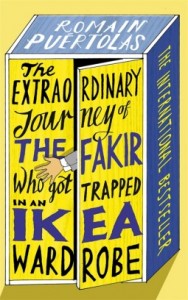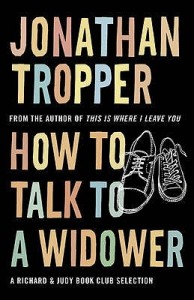 Title: The Extraordinary Journey of the Fakir Who Got Trapped in an Ikea Wardrobe (Goodreads)
Title: The Extraordinary Journey of the Fakir Who Got Trapped in an Ikea Wardrobe (Goodreads)
Author: Romain Puértolas
Translator: Sam Taylor
Published: Harvill Secker, 2014
Pages: 320
Genres: Contemporary
My Copy: ARC from Netgalley
Buy: Amazon, Book Depository (or visit your local Indie bookstore)
“A heart is a little bit like a large wardrobe” — Ajatashatru Oghash Rathod
The Extraordinary Journey of the Fakir Who Got Trapped in an Ikea Wardrobe (or L’extraordinaire voyage du fakir qui était resté coincé dans une armoire Ikea) is the debut novel by Romain Puértolas that has been marketed to fans of The Hundred-Year-Old Man Who Climbed Out of the Window and Disappeared (or Hundraåringen som klev ut genom fönstret och försvann) by Jonas Jonasson. For the purpose of making things easier (and to avoid the insanely long titles) I’ll refer to these two books as The Fakir and The Hundred-Year-Old Man (I hope you can work out which is which. I picked up The Fakir simply because I need to read more translated fiction, with that logic I probably should read The Hundred-Year-Old Man. While the writing styles might not be similar, if you enjoyed The Hundred-Year-Old Man because it was a quirky, fun novel then The Fakir is a book you’ll need to go out and buy.
The novel reminds me of something David Niven (The Pink Panther) or The Marx Brothers would adapt to screen. You know the type of movies I’m talking about; the comedies full of misfortunes and stupidity but everything somehow works out in the end. The novel tells the story of a fakir named Ajatashatru Oghash Rathod flown to Paris for the purpose of visiting Ikea and buying a new bed of nails. Dressed in a fine silk suit to pass himself off as a wealthy Indian business man, the con man had nothing but a counterfeit 100-Euro note (printed on one side only) in his pocket. This trip to Paris sends him off on an adventure that finds him in places like London, Barcelona and Rome and not one sight was seen. No Eiffel Tower, Big Ben, Sagrada Família (unfortunately) or Colosseum.
I’m not sure if it is a problem with the translation but I expected a little more from The Extraordinary Journey of the Fakir Who Got Trapped in an Ikea Wardrobe and I can’t tell if it didn’t translate or a deep seeded desire for something more complex. I enjoy that light read but found nothing funny about the novel and thought it was too inconsequential; I wanted more meat to the story. There were opportunities to explore themes of immigration, friendships, celebrities, travel and Europe but all these were just background and the focus remained on trying to write a quirky comedy. I’m not saying this is a bad thing, sometimes a light palate cleanser is all you need, and I was just ready for something with substance. It doesn’t take much effort to read The Fakir and the book did explore the concept of a culture clash but this was to the extent of something like The Gods Must Be Crazy.
Sam Taylor was the translator for this novel and he has worked on a number of great French novels that are all still sitting on my TBR pile. He has translations include A Meal in Winter by Hubert Mingarelli, The Truth About the Harry Quebert Affair by Joël Dicker and HHhH by Laurent Binet. This leads me to believe that my issues with The Fakir are not with the translation but with the book itself. One other concern I have is not with this book per say but with this need to add real people into the story. I’m not entirely comfortable with basing a novel around a person who is deceased, so it feels a little weird when you have a character named Sophie Marceau in this novel. The Fakir actually refers to Sophie Marceau as the French actress from the James Bond film The World Is Not Enough so we know the author is referring to the celebrity. I often wonder how these people feel about being put into a novel and if they are being portrayed accurately. It doesn’t sit right with me and I’m not sure if I’m the only one that wonders about something as small as using celebrities in a novel; I am sure some novels call for it but it this one didn’t.
I know it sounds like I didn’t enjoy this novel but I tend to pick out the parts of a book that didn’t work for me. I think it is freeing to express all my problems with a book and it may come across as a little negative, but in all honesty, this was a fun, short read. I normally gravitate to books with more substance but something light is a nice change. In all honesty I would have liked the novel to explore at least one of the issues that it presented rather than use them as plot points. Even going deeper into the concept of culture clash could have improved my enjoyment of the novel but I have come to expect that not everyone likes to read complex novels. I suspect The Extraordinary Journey of the Fakir Who Got Trapped in an Ikea Wardrobe to be a runaway success and to be adapted into a film; I wonder who they would get to play Sophie Marceau.

 Title: The Sex Lives of Siamese Twins (
Title: The Sex Lives of Siamese Twins ( Title: How to Talk to a Widower (
Title: How to Talk to a Widower ( Title: The Love Affairs of Nathaniel P (
Title: The Love Affairs of Nathaniel P ( Title: Season to Taste (
Title: Season to Taste ( Title: Summer House with Swimming Pool (
Title: Summer House with Swimming Pool ( Title: The New York Trilogy (
Title: The New York Trilogy ( Title: All That Is (
Title: All That Is ( Title: Loaded (
Title: Loaded ( Title: Eyrie (
Title: Eyrie (